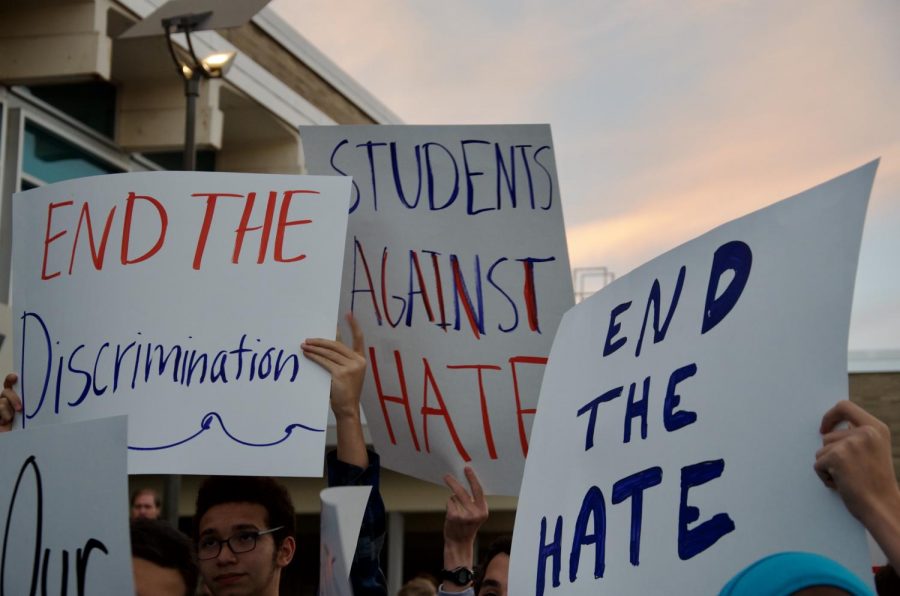Hate is not a political view
Everyone has a right to express their political views, but hate is not one of those views.
Immigration, the economy, taxes, foreign affairs, gun laws and other policies are argued and discussed constantly, whether between Democrats and Republicans in America or between leaders of countries around the world. These political issues are valuable to talk about and all opinions regarding these topics should be respected and challenged. But, hate and bigotry do not fall into that category of political beliefs.
I wholeheartedly believe that everyone should be able to express their political views safely, while also being comfortable with being challenged and having a discussion. Because when a productive discussion about political issues happens, people are able to learn something about other people’s views and gain empathy and knowledge they wouldn’t have had before.
However, enmity is not a political view. Hate should not be something we respect as others’ beliefs. We can discuss policies as political perspectives, but no one should be able to justify xenophobia, homophobia, racism, or other forms of hatred by calling it a “political view.”
For example, the debate over gun control is political. Gun control has nothing to do with how someone is born or how they live. The debate is about laws and regulations relating to how the constitution is interpreted because it stems from the second amendment. These aspects make it an issue of politics, not of personal feelings of hatred.
I realized that people call their hatred a part of their politics when I was talking with a classmate. My classmate was talking about someone who had recently been arguing with her about male privilege. The student she was arguing with expressed strong conservative political views after saying degrading things about women. When my classmate said she respected people’s political views but this was too hateful, I realized that no one should have to respect enmity because hate plainly isn’t a political view.
Calling hate political perspective gives it a pass to exist, and if believed strongly enough, it allows hate to change laws and affect lives. When abhorrence is dismissed as a political perspective, the horror of hostility is removed. Nothing about politics should include hating other people because of the way they’re born or how they live their lives.
Immigration, for example, is an issue that can be discussed as a policy or can be tainted by hatred and turn to a biased, xenophobic discussion. In 2013, the Border Security, Economic Opportunity, and Immigration Modernization Act was written by the “Gang of Eight.” This was a group composed of four Democrats and four Republicans who wrote this act of comprehensive immigration reform.
This group put aside partisan issues and used facts and politics to create this act. Their decision was not supported by hatred for immigrants or hatred for each other. In that case immigration was debated on a basis of politics, not prejudice.
Immigration can just as easily become an issue of animosity and fear mongering. In addition to President Trump calling for a national emergency because of the dangers at our southern border, Trump also made a statement about immigrants that was a thinly veiled nod to xenophobia in his State of the Union speech on Feb. 5. He said, “Year after year, countless Americans are murdered by criminal illegal aliens.” This claim is not backed by politics or facts, only hostility.
First, there is no reliable data to back his claim up because the Bureau of Justice doesn’t include citizenship in its breakdown of national crime and arrests. Second, there is data about how likely immigrants are to be convicted of a crime that opposes Trump’s claim. In a 2018 study by the Cato institute about criminal conviction, data showed that immigrants, whether legal or illegal, are less likely to be convicted of a crime than a native-born Americans. Trump’s statement about dangerous illegal aliens is not supported by fact, but by xenophobia and aversion.
When a policy can barely be backed by any real facts or numbers, the policy is fueled by bigotry and hostility, not by politics. When a policy goes from facts to hate, it’s no longer worth the title of a “political view.” The abhorrence doesn’t deserve a voice or a discussion. It doesn’t deserve the protection and respect a political view has. Politics should never be used to protect and preserve enmity. I hope we can all agree that hate should have no place in our politics and especially no place in the world.
